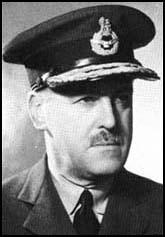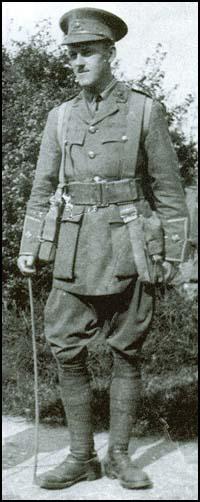Trafford Leigh-Mallory

Trafford Leigh-Mallory, the son of the clergyman, Herbert Mallory, was born in Mobberley on 11th July, 1892. His older brother was George Mallory, who became Britain's most famous mountaineer.
In September 1911 he went to Magdalene College, Cambridge University, to study history. However, on the outbreak of the First World War in 1914 he volunteered to join the the 10th (Territorial) Battalion of the King's Liverpool Regiment. The backbone of the regiment was the local rugby club for whom Trafford played.
On 3rd October 1914 Leigh-Mallory was formally commissioned as an officer. A fellow officer was Godfrey Chavasse. However, whereas Chavasse was sent to the Western Front in November, Leigh-Mallory was transferred to the Fourth Battalion of the Lancashire Fusiliers.
In May 1915, Second Lieutenant Leigh-Mallory and his infantry regiment went into the front-line near Ypres. Despite the foul latrines and the smell of rotting bodies he told George Mallory that: "I must say I am extraordinarily happy here. I never thought I would enjoy it so much."
However, within a few weeks of living in the trenches with having to deal with constant gas attacks his tone changed. "You have an alternative of putting your head down in the trench and being asphyxiated or putting it up over the trench into rapid fire. We have got gag things to put over our mouths, but still many seem to get killed."
On 16th June 1915 Leigh-Mallory was wounded in the leg during an attack on the German trenches at Ypres. As a result of the seriousness of his injury Leigh-Mallory was sent to a hospital in Oxford.
Leigh-Mallory was determined not to return to the Western Front and when he recovered from his wound he joined the Royal Flying Corps in July, 1916. He was mentioned in dispatches several times and was awarded the Distinguished Flying Cross.

After the war Leigh-Mallory began a legal career but in 1919 he returned to the recently created Royal Air Force. Promoted to the rank of squadron leader he specialized in the field of air-ground cooperation.
In 1931 Leigh-Mallory became deputy director of staff studies in the Air Ministry and commander of No. 2 Flying School. He also served as a senior staff officer in Iraq before becoming commander of No. 12 Fighter Group in 1937.
During the Battle of Britain Leigh-Mallory came into conflict with Vice Marshal Keith Park, the commander of No. 11 Fighter Group. Park, who was responsible for the main approaches south-east of London, took the brunt of the early attacks by the Luftwaffe. Park complained that No. 12 Fighter Group should have done more to protect the air bases in his area instead of going off hunting for German planes to shoot down.
Leigh-Mallory was also critical of the tactics of Keith Park and Hugh Dowding, head of Fighter Command. He took the view that RAF fighters should be sent out to meet the German planes before they reached Britain. Park and Dowding rejected this strategy as being too dangerous and argued it would increase the number of pilots being killed.
Air Chief Marshal Charles Portal, the new chief of the air staff, agreed with Leigh-Mallory, and in November 1941, removed Keith Park and Hugh Dowding from their posts. Leigh-Mallory had the added satisfaction of taking over from Park as commander of No. 11 Fighter Group.
In November, 1942, Leigh-Mollary replaced Sholto Douglas as head of Fighter Command. He was knighted in January, 1943 and later that year became commander of the Allied Expeditionary Air Forces for the proposed Normandy invasion. His attempts to control the strategic bombing campaign leading up to the invasion brought him into conflict with Arthur Harris and Carl Spaatz. After pressure from General Dwight D. Eisenhower, Leigh-Mallory was forced to resign.
Leigh-Mallory was now appointed Commander in Chief of Southeast Asia. Trafford Leigh-Mallory was killed on his way to Burma when the aircraft he was travelling in crashed on 14th November, 1944.
Primary Sources
(1) Trafford Leigh-Mallory, letter to George Mallory (11th June, 1915)
You have an alternative of putting your head down in the trench and being asphyxiated (by gas attacks) or putting it up over the trench into rapid fire. We have got gag things to put over our mouths, but still many seem to get killed.
(2) Peter & Leni Gillman, The Wildest Dream: The Biography of George Mallory (2000)
George Mallory celebrated the end of the war with his brother Trafford, whose career had followed a spectacular path since he had been invalided home in 1915. He had resolved not to return to the trenches and had trained as a pilot instead. In 1916, the year he got married, he joined the fledgling Royal Flying Corps and by the end of the war was a Royal Air Force squadron commander. On Armistice Day he sent a car to fetch George and they spent the evening at the officers' club in Cambrai. "It was a good evening," George told Ruth, "with much hilarity and no drunkenness." The predominant feeling, he wrote, was one of release. "What a freedom it is now! I seem to he inundated by waves of elation and to he capable now of untroubled joy such as no one has known during these 4 years since the war began.
(3) Robert Boothby, Boothby: Recollections of a Rebel (1978)
The treatment of the Commander-in-Chief Fighter Command, Dowding, after he had won the most critical battle for this country since Drake, was so atrocious that it hardly bears description. He may well have made mistakes. His two principal Group Commanders, Keith Park and Leigh-Mallory, disagreed about tactics; and it has been argued that he should have knocked their heads together, and forced them to conform to his own views, or go. Instead he let them both fight in the way they wished. But all criticism fades before the victory achieved under his supreme command. The story that immediately after the battle he was sacked over the telephone by the Secretary of State, Sir Archibald Sinclair, is untrue. That would have been entirely out of character. On the contrary, Sinclair sent for Dowding to offer him his personal congratulations. This, however, did not prevent Dowding's headquarters staff from being ordered to vacate their offices within forty-eight hours, or the immediate dismissal of Dowding himself.
After that an enquiry was set up by the Air Ministry, to which Dowding and Keith Park were summoned. There they found themselves confronted by an array of Air Marshals, which included Leigh-Mallory. It was more like a court-martial than an enquiry. Dowding as was his custom, said nothing. He just disappeared. No one now maintains that he should not have been relieved of his command after the appalling strain to which he had been subjected, or that Sholto Douglas was not his obvious successor. What is almost inconceivable is that he was never made a Marshal of the Royal Air Force. Some years later he was given a peerage; but by then he had been forgotten.
